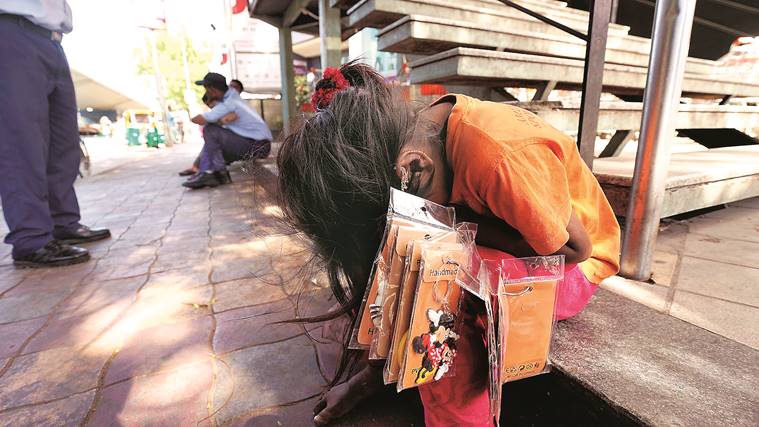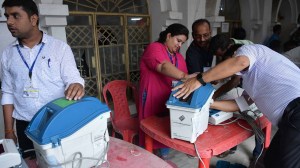- India
- International
MSU study on Vadodara street children: 61% took to selling items on road to support family, 56% never been to school
A study conducted by a student of M S University found that that 61% of such street children in Vadodara city became vendors to financially support their families. It also found that 56.25% of such children have never been to school, while out of the remaining children who have been to school, 53.33% dropped out of school between class IV and VI.
 As per a 2016 government survey, 1,611 children lived on Vadodara’s streets. (Express Photo by Bhupendra Rana)
As per a 2016 government survey, 1,611 children lived on Vadodara’s streets. (Express Photo by Bhupendra Rana)
Like other children of their age, 12-year-old Rohit and his younger brother Rahul (10) talk about ‘Hulk’ and ‘Hathoda man (Thor)’ — the superheroes from Avengers series – near one of Vadodara’s prominent malls. And unlike many of the children of their age, the siblings sell key chains, stickers, drawing books and decorative fridge magnets near the mall.
Barefooted and wearing shabby T-shirts and torn pants, the brothers spend nearly 12 hours a day — from 8 am to 8 pm — near the mall selling trinkets. They live by the roadside close to Pandaya bridge with their grandmother, who begs to eke out a living, and their two elder siblings, who also sell similar items near another mall in the city. Both Rohit and Rahul say they are enrolled in a government school and attend school regularly. Only during summer vacation, they sell small items for extra money. They eat two free meals at a nearby temple and use a public toilet.
A study conducted by a student of M S University found that that 61% of such street children in Vadodara city became vendors to financially support their families. It also found that 56.25% of such children have never been to school, while out of the remaining children who have been to school, 53.33% dropped out of school between class IV and VI.
The study conducted by Nidhi Sardar, a senior Masters student from the Department of Extension and Communication at the Faculty of Family and Community Sciences, surveyed 80 such children from 12 different pockets of Vadodara city.
“The thing which drives these children to sell things on streets at such a tender age is money, and they learn that money is power. Parents do appreciate and consider their child worth if he or she earns money for home rather than goes to school to study,” says Dr Avani Maniar, Associate Professor at the Department of Extension and Communication at the Faculty of Family and Community Sciences and the guide in the study.

The study also explored the living conditions of these children and their hygiene habits.
According to the survey, 33% of the total sample defecates in open by the roadsides, 15% under bridges, 28% used public toilets, while 8% go to ponds and lakes. Only a glaring 2.5% claim to use soap to wash their hands after defecation, while 8.75% use ash, 11.25% soil and maximum 41.25% children claim that they don’t wash their hands after defecating.
Besides, 25% of the children use public toilets for bathing, while 42% say that they take bath at roadside water points. One out of 10 claim to take bath in ponds and lakes, while 1.25 % even use the facilities inside shopping malls, but none has access to water for bathing at home. Of the sample, 16% of the children say they don’t bath on a regular basis.
The study found that 25% of these children fall sick — cold, diarrhoea and fever — every week.
Three-quarter of the surveyed children slept by the roadsides, while 5% do not have any fixed place to sleep. Over 80% of them say that they have temporary settlements.
As per the 2016 survey conducted by National Child Labour Project (NCLP) society in Vadodara, under the Ministry of Labour and Employment, a total of 1,611 children between the age group 6 to 14 were residing on the city’s streets. However, how many of them were involved in earning through selling items on the street was unaccounted for.
The NCLP at present also runs nine training centres where such kids are rescued and enrolled for basic education and vocational training. Dr Maniar says not just children, parents should also be educated regarding child rights. “There should be vocational training and entrepreneurship-related skills in schools, which will motivate the parents to send their kids to school,” the professor says.
Apr 19: Latest News
- 01
- 02
- 03
- 04
- 05






































